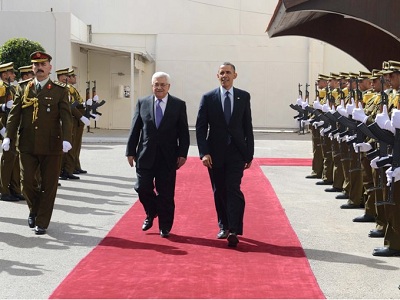
By Jamal Kanj
Palestinian President Mahmoud Abbas signed a $3.9 billion national budget for the 2013 fiscal year just one day before the March 31 deadline. The budget was approved without the required constitutional review and endorsement of the Palestine National Council. The state’s projected revenue for this year is $2.6bn, leaving a deficit of $1.3bn to be bridged by international benefactors.
Budget approval came on the heels of US President Barack Obama’s visit, during which he revealed a decision to release approximately $500 million in US aid to the Palestinian Authority (PA). This includes $295.7m withheld by Congress last year to punish the PA for upgrading its status at the United Nations (UN). The remaining $200m was for budgetary assistance in 2013. By releasing the aid to the PA, Obama bypassed the US Congress’s objections by declaring that it was in “the security interests of the US”.
The freezing of US funding and a dearth of European Union (EU) assistance resulted the PA facing a deficit of approximately $1.2bn last year. Although Arab states pledged a safety net to supplant withheld US aid just as Israel seized tax money, in reality the PA was left with a “loose net” but for limited emergency backing from individual states, following a direct appeal from the Palestinian president.
Late last year and in January, the Palestinian government was forced to delay salary disbursements or pay partial salaries for the large number of state bureaucrats.
This led to a series of street protests and an increase in the level of confrontations with the Israeli occupying force.
Fearing what the World Bank called “social upheaval”, Israeli Prime Minister Benjamin Netanyahu ordered in January for the immediate release of about $70m in tax revenue seized from the PA to help it “enforce calm on the ground.”
Approximately $1.2bn of the PA budget is administered exclusively by Israel – from which it deducts a 10 per cent fee. This leaves the Palestinian state in control of only $1.4bn of its revenue, or 36pc of its total budget. The government of Palestine can’t continue to function on handouts from the EU and US, or taxes collected by Israel – especially when the US empowers the same occupation that deprives Palestinians of enough resources and minerals to bridge most, if not all, of the budget deficit.
In a 2012 report, the World Bank blamed Israeli policies for stymieing “investment” and the lethargic “private sector”. The report concluded that growth is not “sustainable until Palestinians have access to resources and are allowed to move freely”.
Last month, Norwegian Foreign Minister Epsen Barth Eide attributed the PA’s continued financial crisis to Israeli restrictions in occupied Palestine. In addition to negotiations, if conditions would ever allow it, Palestine should consider pursuing in tandem a plan to delegitimize Israel’s unilateral moves.
Locked out of the UN Security Council by US veto power, the PA should at least consider taking steps like accelerating its Unesco applications to register Muslim and Christian places of worship in Jerusalem and other cultural locations as protected World Heritage Sites. The Palestinian leadership should stop its hollow threats of going to the International Criminal Court (ICC) if Israel starts executing its plans to build more “Jewish only” colonies. Palestine should first become a full-fledged member of the ICC and join other UN organizations.
They must develop a new approach whereby for every Israeli unilateral action, there is an equal, independent Palestinian reaction.
Decades of bleating to pitiful world powers in closed meeting rooms has only accelerated the building of “Jewish only” colonies on the hills of the West Bank and East Jerusalem.
In the absence of peace, the inept international community will succumb to special interest groups and choose the status quo instead of confronting Israeli intransigence. But foreign aid money should not become an “opium” with which to preserve the status quo in Palestine.
– Jamal Kanj (www.jamalkanj.com) writes weekly newspaper column and publishes on several websites on Arab world issues. He is the author of “Children of Catastrophe,” Journey from a Palestinian Refugee Camp to America. He contributed this article to PalestineChronicle.com. (A version of this article was first published by the Gulf Daily News newspaper on April 04. Visit: www.gulf-daily-news.com)




